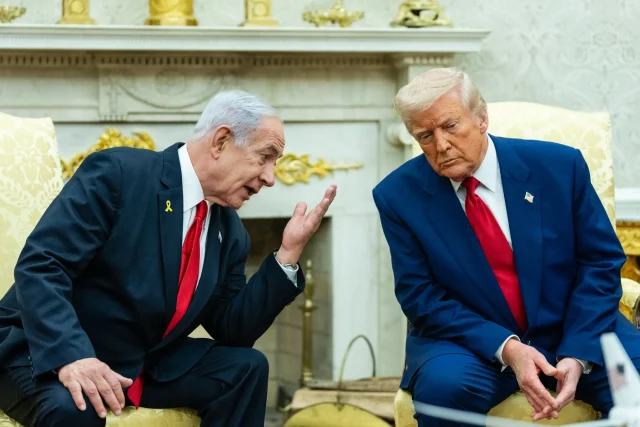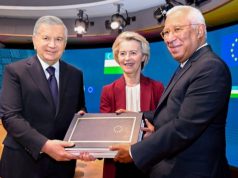By Rehan Khan
 ISLAMABAD, Tuesday, June 17, 2025 (WNP): U.S. President Donald Trump, who had initially maintained a posture of neutrality in the escalating conflict between Israel and Iran, dramatically shifted tone this week, issuing a series of strong statements that signal a hardline stance toward Tehran.
ISLAMABAD, Tuesday, June 17, 2025 (WNP): U.S. President Donald Trump, who had initially maintained a posture of neutrality in the escalating conflict between Israel and Iran, dramatically shifted tone this week, issuing a series of strong statements that signal a hardline stance toward Tehran.
In remarks that have drawn international scrutiny, President Trump declared that the situation was spiraling out of control, warning that the Iranian regime must “surrender,” evacuate strategic locations such as Tehran, and “immediately sign the Nuclear Non-Proliferation Treaty.” He went further, calling for a full rollback of Iran’s nuclear program, citing global security concerns.
“Our horses are getting out of control,” Trump stated in a cryptic message on social media that has since gone viral. “Iran must act now. The world cannot afford to sit idly by as Tehran advances a nuclear agenda that threatens peace on every continent.”
The President’s remarks come amid intensifying hostilities between Israel and Iran, with fears growing that the conflict could engulf the wider Middle East. Until now, the White House had refrained from taking sides publicly, urging de-escalation and restraint on both ends. However, Trump’s latest comments mark a stark departure from that approach, revealing a clear alignment with Israeli concerns.
Israeli Prime Minister Benjamin Netanyahu, in a separate statement from Jerusalem, welcomed Trump’s comments and reiterated Israel’s longstanding opposition to Iran’s nuclear ambitions.
“We are deeply alarmed by Iran’s nuclear program,” Netanyahu said. “This is not just a threat to Israel — it’s a threat to the entire international community. That’s why we demand immediate rollback.”
Iran has consistently denied that its nuclear program is designed for military purposes, insisting it is meant for peaceful energy development. Tehran is not currently a signatory to the updated version of the Nuclear Non-Proliferation Treaty (NPT), and negotiations over a potential new accord have stalled in recent months due to rising tensions and mutual mistrust.
Trump’s renewed push for regime change in Tehran and insistence on disarmament mark a potentially volatile escalation in the rhetoric surrounding the conflict, raising concerns about the prospect of direct U.S. involvement in the region.
International observers, including officials from the United Nations and European Union, have expressed alarm over the spiraling narrative, urging all parties to return to diplomacy and avoid unilateral actions that could ignite a broader war.
As regional dynamics continue to shift rapidly, analysts warn that the United States’ apparent pivot toward confrontation with Iran could further destabilize an already fragile geopolitical landscape.




